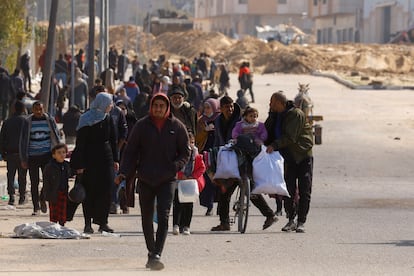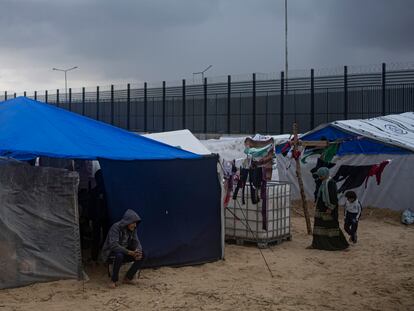‘They treat us like a sack of money’: The opaque network charging Gazans thousands of dollars to flee to Egypt
Palestinians trying to escape the desperate situation in the Strip are charged up to $11,000 by middlemen to secure permission to cross the border at Rafah

When the first lists of Egyptian citizens authorized to leave Gaza as part of the evacuation of foreigners trapped in the Strip by Israel’s military offensive were published, some people realized that something did not add up. A young Gazan, who spoke to EL PAÍS on condition of anonymity for security reasons, explains that he found, in the middle of those lists, the names of members of wealthy Gazan families who held no nationality other than Palestinian — a group of citizens who in theory had no right to leave.
It soon became an open secret that, despite the official Egyptian policy of keeping the border closed to Gazans — to avoid being party to an ethnic cleansing of the Strip — there was a way to circumvent the veto. “We knew [those families] well, so we wondered how they had gotten out. And we found out that the border was open to whoever had money,” says the young man, who was then in Rafah, in the south of the Strip on the Egyptian border, after fleeing Gaza City with his family following expulsion orders from the Israeli army.
The problem was not that they were asked for money to leave. It was that they were asked for a lot of money: $10,000. Even so, his entire family, after considering their options, decided that it would be best to use their savings to at least get him out of Gaza to try to help them from outside. The alternative was to for them all to remain in the Strip, with no prospects and their money evaporating rapidly due to spiraling prices in the enclave. It was then that he went to a cold office where they took his name and collected the money. Just 48 hours later, in the evening, the young man received a call summoning him to report to the Rafah border crossing at 6 a.m.
Once on the Egyptian side of the border, the Gazan claims that having paid so much money did not spare him from being thoroughly investigated by the local authorities, nor from hours of waiting. Or from having to produce more money to pay for everything: the visa, the exit form, his luggage, transportation. “You are guaranteed to be the exception,” he notes, but “this money you only pay to get through.” After leaving Gaza, he is now residing in an Asian country. “They treat us like a sack of money,” he laments.
Like him, Palestinian citizens of Gaza who want to leave the enclave are forced to pay an opaque network of intermediaries between $4,500 and $11,000 to obtain a permit to enter Egypt, according to three testimonies collected by this newspaper. To pay for this process, many Gazans embark on crowdfunding campaigns on the internet. EL PAÍS was able to verify the existence of more than 100 operations of this type. In most cases, the amounts requested range between $7,000 and $10,000, while for children the sums can fluctuate between $1,000 and $3,000.

Allegations of bribery
The ins and outs of the process and how middlemen in Gaza get those who pay across the border is unclear. But a joint investigation by the Egyptian media outlet Saheeh Masr and the global network of investigative journalists at the Organized Crime and Corruption Reporting Project (OCCRP), based on more than a dozen interviews, shows that the ability to quickly get the go-ahead from the Egyptian security services that control the border gives rise to accusations that a system of bribes is greasing the mechanism.
The director of the Egyptian State Information Service, Diaa Rashwan, who acts as an official spokesperson for Cairo, called reports of fees being charged to travelers at the Rafah crossing “false accusations” in a statement issued in late January. He called on Palestinian citizens to inform the Egyptian authorities at the crossing of any attempt or request to collect illegal fees.
But this opaque network of middlemen and travel agents in Egypt and Gaza has been active for years, according to media and human rights groups. When times are calm, they expedite permission for Gazans to enter Egypt. And in periods of tension, during which the border may remain closed, they make it possible to leave the Strip. Between late 2014 and mid-2018, the Rafah crossing was closed almost every day, crossing data confirms, due to Egypt’s counterterrorism operations in the turbulent North Sinai region. Since then, it remained steadily open. However, in 2016 Qatari broadcaster Al Jazeera documented payments to middlemen of up to $10,000 by Palestinians wanting to leave Gaza.
According to a 2018 report by the UN Office for the Coordination of Humanitarian Affairs (OCHA), the exit of people through Rafah is “confusing and opaque” due to the existence of two procedures. On the one hand, the official electronic process, managed through the Strip’s Ministry of the Interior. And on the other, a list coordinated by the Egyptian authorities. The report warned of the payment of bribes in Gaza and Egypt to guarantee travel and a faster response in cases handled through the second route.
“In 2022 we published a report on the occasion of 15 years of the Gaza blockade, and the difficulties in getting out was one of the things we documented. The Israeli authorities bear a lot of responsibility, but so do the Egyptian authorities, because they control the Rafah border,” says Ahmed Benchemsi, communications director for the Middle East and North Africa at Human Rights Watch (HRW). “From the testimonies we collected, we heard that some Egyptian authorities were asking for money from Palestinians who wanted to cross. They were basically extorting money from them.”
Another Gazan, who is still in the Strip and is trying to raise the money to leave the enclave, says that although he has siblings with mental disorders, the amount demanded by the middlemen is similarly $10,000 per head. “We don’t get any help and we need this coordination to cross Rafah and be able to enter Egypt, but it is very expensive and difficult,” he explains, also asking for anonymity.
“Coordination” is what the role of the middlemen who make it possible for Palestinians to cross Rafah through the unofficial listing is known as locally. The most prominent middleman, according to testimonies gathered by this newspaper and other investigations, is an Egyptian travel agency called Hala, which according to its Facebook posts has several agents in Gaza and periodically opens registration for Egyptian citizens in the Strip to initiate the procedure for travel.
The company is owned by Ibrahim al-Ergany, a businessman close to the highest echelons of the Egyptian state and founder of a federation of families and tribes in North Sinai that since 2017 has been collaborating with the Egyptian army and security forces in their anti-terrorist fight in the area, according to the independent Egyptian media outlet Mada Masr. One of his companies, Beni Sinai, was a major beneficiary of Gaza reconstruction plans following Israel’s 2021 offensive. And Hala’s Cairo address is the same as Beni Sinai’s headquarters, his LinkedIn profile shows.
The third testimony collected by this newspaper, provided by a man who is in Europe trying to get his wife out of Gaza, points out that there are other intermediaries who charge less than Hala and can lower the price to $5,000. But this route offers few guarantees. “There are people who do the cheapest coordination, but maybe they are setting you up, maybe it’s a lie, or maybe they give you an assignment,” he explains without elaborating. “If I had $5,000, I would have paid by now, but I still don’t have that amount.”
Once across the border at Rafah, the first witness says the treatment they receive from the Egyptian authorities is generally bad. But he says that the alternative is worse. “It’s very tiring. I have survived six wars. [When I got out] I was disappointed, all I could think about was that I lost my university, I lost my friends, my job, my career, my future. I was heading toward nothingness,” he says. “But nothingness was better than dying in war. I’m a survivor of genocide and anything is better than staying there.”
Sign up for our weekly newsletter to get more English-language news coverage from EL PAÍS USA Edition
Tu suscripción se está usando en otro dispositivo
¿Quieres añadir otro usuario a tu suscripción?
Si continúas leyendo en este dispositivo, no se podrá leer en el otro.
FlechaTu suscripción se está usando en otro dispositivo y solo puedes acceder a EL PAÍS desde un dispositivo a la vez.
Si quieres compartir tu cuenta, cambia tu suscripción a la modalidad Premium, así podrás añadir otro usuario. Cada uno accederá con su propia cuenta de email, lo que os permitirá personalizar vuestra experiencia en EL PAÍS.
¿Tienes una suscripción de empresa? Accede aquí para contratar más cuentas.
En el caso de no saber quién está usando tu cuenta, te recomendamos cambiar tu contraseña aquí.
Si decides continuar compartiendo tu cuenta, este mensaje se mostrará en tu dispositivo y en el de la otra persona que está usando tu cuenta de forma indefinida, afectando a tu experiencia de lectura. Puedes consultar aquí los términos y condiciones de la suscripción digital.









































